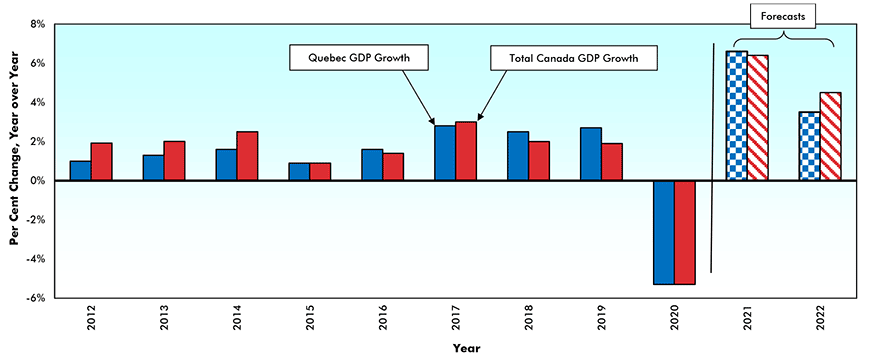It appears there’s now an answer to the question posed in Snapshot #12, dated June 24, 2020, “Is a V-Shaped Recovery in Quebec’s Future?” The response is a definite ‘Yes’. Further, the likelihood of the current recovery continuing is heightened by the fact that although COVID-19 and particularly the new Delta variant remain significant threats, the province has managed to cover a country-leading 73.8% of its population aged 12 and over with at least one vaccination ‘shot’.
Post-pandemic rebound in U.S. growth to drive Quebec’s exports
Year to date, Quebec’s total exports are up by +12.2% mainly thanks to strong growth in the U.S. A booming U.S. housing market and strong auto sales have combined to cause shipments of forest products and aluminum, combining for 30% of Quebec’s U.S. sales, to more than double year-to-date. Through the remainder of this year and well into 2022, sustained U.S. growth should provide Quebec with a strong tailwind. A recent proposal by the U.S. Commerce Department to double the tariff on Canadian lumber imports does pose a threat to Quebec’s exports. However, implementing this proposal will be difficult given its potential impact on already overheated U.S. house prices.
Hiring boost in accommodation and food services and retail
Measures to limit the second and third waves of the coronavirus in Quebec have been much less restrictive than those implemented following the first wave. As a result, total employment in the province is just -3% below its pre-COVID-19 level. Sectors with significant hiring gains over the past 12 months include accommodation and food services, education services and construction which are collectively up by +25% y/y. Going forward, the sharp rise in full-time hiring plans reported by CFIB in their most recent (May) Business Barometer suggests employment will exhibit sustained growth throughout the remainder of this year and into early next year.
Outlook for consumer spending brighter
Underpinned by the stronger pattern of hiring, the major contributor to the V-shaped recovery has been consumer spending, as reflected by retail sales. In the wake of the second wave of COVID-19, Quebec’s most recent retail sales have surged by +12%, well ahead of the roughly +2% gain they posted during the first quarter of 2020. This very strong rebound in spending has been due to a +25% increase in sales of motor vehicles and a +57% jump in sales of building materials.
There is a risk that the third wave of COVID-19 cooled consumer spending in April and possibly in May. However, the impact of a vaccine-induced surge in May’s consumer confidence, together with the very positive hiring climate, suggest spending will rebound in the final months of the second quarter and remain strong throughout the second half of 2020.
Strong gains in residential building approvals
Despite the above-noted gains in hiring, near-record-low interest rates and strong consumer confidence, the recent pattern of existing home sales suggests that housing demand in Quebec has cooled somewhat.
After exhibiting an unsustainably large increase since mid-2020, they appear to have hit a cyclical peak of 11,580 units in January. Since then, there’s been a slight slowing through May. In response to the surge in existing home sales, housing starts year to date have risen by +64%.
Going forward, the strong fundamentals noted above, together with the impact of a rebound in net migration, should underpin both new and existing home sales and cause residential construction to make a strong contribution to growth through the remainder of this year and well into 2022.
A post-pandemic rebound in both private and public capital spending
After retreating by an estimated -5% in 2020 due to COVID-19, there is little doubt that capital spending on major projects will rebound in 2021 and likely remain strong in 2022. The Survey of Non-residential Capital and Repair Expenditures reported that total (public sector plus private sector) capital spending will increase by +11% this year.
Spending in 2022 will receive a significant boost from the recent spate of public sector spending projects announced in the recent federal and provincial budgets. Major projects which will contribute to this increase in spending include the extension of the Montreal Subway Blue Line, major repairs to the Ville-Marie and Viger Tunnels in Montreal and the Niobec Niobium Mine in St-Honoré.
Bottom line
Although Quebec has been hit harder by COVID-19 in terms of deaths per 100K population than the rest of the country, it has exhibited a very robust recovery indicated by its strong pattern of employment growth over the past 12 months and the fact it has the country’s lowest unemployment rate. Given this robust turnaround in hiring and the positive outlook for both domestic and external demand, the province should outpace the rest of Canada in 2021 and exhibit sustained, albeit more moderate, growth in 2022.
John Clinkard has over 35 years’ experience as an economist in international, national and regional research and analysis with leading financial institutions and media outlets in Canada.
Real* Gross Domestic Product (GDP) Growth — Quebec vs Canada

Chart: ɫ��ɫ — CanaData.
Please click on the following link to download the PDF version of this article:


Recent Comments
comments for this post are closed